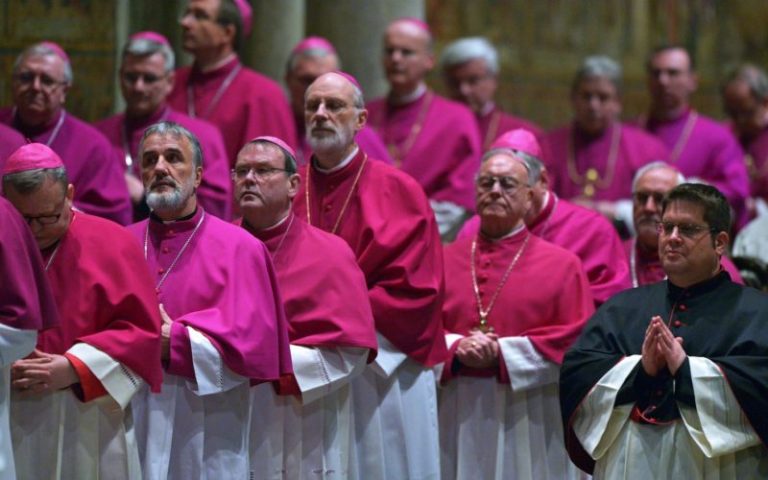Keeping the ‘Catholic’ in Catholic Schools
February 27, 2018Rev. James V. Schall, S.J.: On Being Catholic
February 27, 2018
Photo: Prelates and other clergymen attend Mass at the annual meeting of Germany’s bishops in Cologne. (CNS)
Canon law does not envisage the ongoing reception of Communion by someone who remains Protestant
By Ed Condon, Catholic Herald, Friday, 23 Feb 2018
To the shock and dismay of many Catholics, the German Bishops’ Conference has voted by an “overwhelming” margin to produce a “guide” on the reception of Communion by the Protestant spouses of Catholics. The news is indeed concerning – but let’s be clear: we are not dealing with any kind of canonically or doctrinally authoritative document. Even once it has been written – at the moment, no such guide exists – the German bishops have conceded that, as a conference, they do not have the ability to legislate on this matter and that it would be for bishops to apply this forthcoming guide to their individual dioceses.
Nevertheless, this is – to say the least – a rash step for such a powerful bishops’ conference to take. The bishops have agreed that following a “serious examination of conscience” guided by a priest or another pastoral guide, a Protestant spouse who “affirms the faith of the Catholic Church” and wishes to end “serious spiritual distress” and a “longing to satisfy a hunger for the Eucharist” should be able to receive Communion.
These guidelines would seem to go well beyond canon law, which puts very definite limits on who can receive Communion and when. “Danger of death” or comparable “grave necessity” is what the Code of Canon Law speak about for Protestants. Clearly this is only envisaged as a one-off occasion. The German bishops’ intentions appear to go well beyond and provide for some kind of stable arrangement – receiving Communion week after week – which is completely outside what the Church provides for.
A key requirement of canon law, which the German bishops have included in their own deliberations, is that a Protestant “manifest the Catholic faith in respect to these sacraments” (c. 844 §4). But to really believe in the Eucharist doesn’t just mean believing in the Real Presence; it means one has to believe in what comes with it, including the reality of the sacramental priesthood, and the validity and efficacy of the rest of the sacraments, and the authority of the Church over them. The social teaching of the Church is often described as a “seamless garment”, and this is even more true of the sacraments.
Now, if a Protestant spouse believes in the claims of the Catholic Church, and does so continuously, receiving Communion week after week, they would effectively be professing themselves to be Catholic, and should be properly received into the Church accordingly. The German bishops’ plan – however much they deny it – sounds very much like a template for pseudo-conversions: these Protestant spouses would essentially be Catholics in belief but not in name. In Germany, the bishops claim the power to deny Catholics the sacraments, even a Christian burial, if they don’t pay their Church tax; but they are apparently happy to hand out the sacraments to Protestants for free.
Of course, until the text of the guidelines is published, it is hard to guess how flawed their reasoning really is. Even then, such a document would have not legal force – though it could prove a serious inducement to error. What we can say is that it appears the German Bishops’ Conference is preparing to play fast and loose with the source and summit of Christian life. They risk treating the Eucharist as a mere expression of unity between Catholics and Protestants – and so committing the serious error of placing our communion with each other ahead of communion with God and the Church.
________________
Ed Condon is a canon lawyer and a contributing editor of the Catholic Herald. On Twitter he is @canonlawyered







